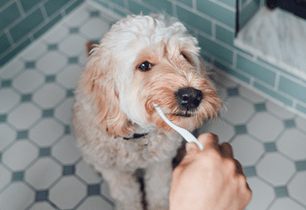
It’s an unfortunate fact that nearly 80% of dogs have periodontal disease by the age of 3! Because dental problems are some of the most common (and costly) issues seen in adult dogs, teaching your puppy to enjoy brushing while they’re still young will get them started on a path toward good oral health.
Brushing your puppy’s teeth now and in the future will help keep their teeth and gums in tip-top shape. Make dental care a positive experience by praising your puppy throughout the whole experience, reassuring them through every step.
First, get your puppy comfortable with having their mouth handled. Gently rub your pet’s muzzle several times a day, followed by raising their lips and rubbing their gums with your fingers. If your puppy is mouthy, spend a longer time on this step and make it extra rewarding by rubbing something yummy, like peanut butter, on their gums.
Next, cover your finger with gauze or a damp face cloth and rub your puppy’s gums along the tooth line. Then introduce a toothbrush and toothpaste approved for dogs. Let your puppy sniff and lick the brush. Never use human toothpaste—it’s not designed to be swallowed by pets.
Many pet toothpastes are formulated to taste good to your pup. You can occasionally use a taste of the toothpaste as a treat to help your puppy associate the toothpaste with good things.
Once your puppy is completely accustomed to you rubbing their teeth with a cloth and shows no fear of the toothbrush, it’s time to start using the toothbrush to brush their teeth.
Be sure to wash your hands thoroughly with soap and water after you’re finished, because a dog’s mouth contains plenty of bacteria.
You should continue attempting to brush your puppy’s teeth into adulthood. Veterinary dentists recommend brushing your pet’s teeth once daily. For many pet owners, this isn’t feasible. Remember that brushing your puppy’s teeth a couple times per week is better than never! And tooth brushing isn’t your only option for improving your pet’s dental health.
Dental chews and dental toys could be added to your puppy’s care routine to help promote good oral health. These chews and toys work by scrubbing plaque and tartar off their teeth as they chew. If you can’t routinely brush your puppy’s teeth, consider dental chews as an easy alternative. Just keep in mind that brushing your puppy’s teeth is the gold standard and is most likely to make the most significant difference in the long run.





